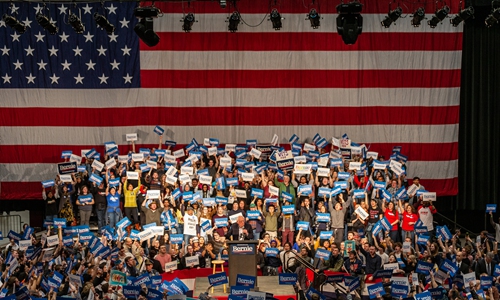HOME >> OPINION
Will epidemic become a ‘black swan’ for US election?
Source:Global Times Published: 2020/3/5 0:55:54

Democratic US presidential candidate Senator Bernie Sanders addresses a rally at The Saint Paul River Centre on Monday in Saint Paul, Minnesota, on the eve of "Super Tuesday" Democratic presidential primaries. Photo: AFP
Editor's Note:
Super Tuesday is one of the most significant days in the US Democratic primary elections, with 14 states holding primaries in a single day. Will Super Tuesday define the trend of the future election results? Can Democrats defeat the incumbent President Donald Trump? Will the coronavirus epidemic become a "black swan" for the 2020 presidential election? Global Times reporters discuss these questions with two Chinese experts.
Li Wei, deputy director of the Center for American Studies, Renmin University of China
Ahead of Super Tuesday, Bernie Sanders, the most progressive candidate of the Democratic Party, stood as the front-runner, winning the contests in three US states out of four. But Super Tuesday helped the party's moderate wing turn the tide to some extent. In particular, after Pete Buttigieg and Amy Klobuchar dropped out, the moderate wing has started to consolidate around Joe Biden.
Except for Sanders and Biden, the other candidates performed poorly. Mike Bloomberg ended his bid for the Democratic nomination after a feeble showing. After Super Tuesday, it is very likely that only Sanders and Biden will keep competing for the nomination.
However, no matter who won Super Tuesday, it will be hard for the Democrats to defeat Trump. Sanders has described himself as a "democratic socialist." Even within the Democratic Party, there exist certain strong forces opposing his "socialist" ambitions, such as universal healthcare and free education. The Republican Party is even less ready to accept a "socialist" like Sanders. If Sanders becomes the Democratic Party's nominee for president, he will have a slim chance of winning. As for Biden, although he has a relatively broad base, many Americans believe he has less personal charm than Trump does.
We cannot rule out the possibility of some "black swans" for the election taking place. The ongoing coronavirus epidemic might be one. On the one hand, it will test the current US administration's governing ability. On the other, the economic slowdown the outbreak will inevitably cause might arouse the public's dissatisfaction. However, as the epidemic in the US has just started, it remains uncertain how it will develop in the near future and what impact it will have on the election.
Wei Zongyou, a professor at the Center for American Studies, Fudan University
Former vice president Joe Biden rode a wave of momentum into Super Tuesday, the day Democrats in 14 states hold presidential primaries or caucuses and one of the most pivotal votes in the race to see who will lead the party in the US presidential election campaign.
Biden's momentum was a result of his sweeping victory in South Carolina's primary on Saturday, in which he knocked out moderate rivals Pete Buttigieg and Amy Klobuchar, and Tom Steyer also suspended his campaign. Buttigieg and Klobuchar have thrown their support behind Biden.
Senator Bernie Sanders - who declares himself to be a "democratic socialist" - causes worries among many Democrats. They see Sanders' campaign promises, which include healthcare for all, free college tuition and a higher minimum wage, as heresy, radical and far-left. The US elites stand no ground for socialism and Sanders' endorsement of northern Europe's governance style is a serious departure from US traditions.
If we accept that Trump won the US presidency in 2016 by creating wedges between white voters and ethnic minority groups, then Sanders is being seen as waging a "class war." Over the past few decades, US welfare programs have been in decline and the gap between the rich and poor has widened. While the US unemployment rate is low, working class people and low income earners don't feel they have benefited. This is why Sanders' proposal for a new tax on the extremely wealthy has gained popularity among American youth, including whites, blacks, and Latinos.
Many young people in the US believe the Democratic establishment, represented by Biden, is in collusion with the Republican establishment which serves only the interests of the powerful. Sanders' anti-establishment ideas hold certain public support that should not be ignored.
As former vice president, Biden is known for his pragmatic and moderate domestic and foreign policies. If Biden becomes the Democratic candidate and beats Trump in the general election, it's likely he will pick up Barack Obama's legacy, making his administration seem like Obama's third term. He is unlikely to support radical policies such as free healthcare and taxing the wealthy.
Biden is likely to stress the importance of China-US relations, but will also pressure China on issues such as trade, intellectual property rights and even human rights.
As a political veteran, Biden is well aware that the Taiwan question is the most important and most sensitive core issue in bilateral relations and he is unlikely to play the fool with the one-China principle.
It is too early to tell which Democrat will emerge from the messy Democratic presidential nomination contest and compete with Trump. Though the threat of the novel coronavirus is increasing, unless it becomes a huge epidemic in the US, it will only be a marginal topic during the election campaign.
Posted in: VIEWPOINT